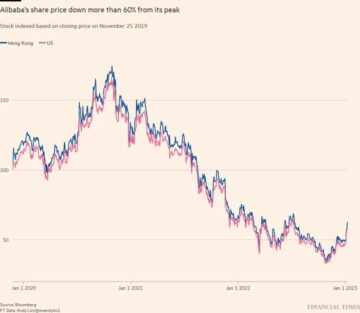
The headlong growth of cloud computing has reached a watershed, as increasingly cost-conscious customers and economic pressure combine to dampen one of Big Tech’s hottest growth markets.
“There’s huge pressure from customers to reduce their costs,” said Barry Briggs, a former Microsoft executive and now an analyst at independent research firm Directions on Microsoft.
After seeing their cloud bills soar as they move larger parts of their computing on to the platforms run by companies such as Amazon, Microsoft and Google, he added, many customers are getting smarter at working out how to squeeze costs out of their cloud spending.
Amazon and Microsoft both pointed to efforts by customers to “optimise” their cloud spending for a surprising drop in cloud growth in the latest quarter.
Revenue at Microsoft’s Azure cloud platform grew 42 per cent before the effects of foreign currency moves, a point below expectations, while Amazon Web Services sales grew 27 per cent, the slowest quarterly growth rate since Amazon started breaking out cloud sales from overall revenue.
The pressure on growth comes as many large companies have faced sharply rising bills as they move more of their computing into the cloud. The chief technology officer of one large bank complained that the biggest cloud companies had not moved fast enough to reduce fixed charges for things such as storage and computing as the volume of business has soared, despite the greater efficiencies that come from operating at massive scale.
The companies tried to put a brave face on the growth shortfall, saying they were working with customers to help them get more value out of their services, and that this would pay off in the longer term.
“In this particular period, I think we are going to optimise for long-term customer loyalty,” Microsoft’s chief executive Satya Nadella told analysts after his company’s latest earnings.
But the result surprised Wall Street and pointed to an unexpected slowdown in the hot cloud market, which most experts believe is still in its infancy.
The companies are trying to turn the retrenchment to their advantage, compensating for the pressure on spending by getting customers to buy more of their services or sign up to longer-term deals.
Amazon said one way it was helping customers save money was to move their computing workloads on to its own chips, something that could boost its efforts to become a full, vertically integrated tech company. It already designs its own high-performance processors, called Graviton, as well as accelerators to speed up machine-learning calculations, called Trainium, putting it in direct competition with established chip companies such as Intel and Nvidia.
AWS is also offering discounts to customers that channel more of their cloud business to its data centres, potentially squeezing out smaller competitors.
“They want you committed to spending a large amount of money and growing on their platform, and not considering other cloud providers,” said Corey Quinn, of The Duckbill Group, a consulting firm for companies looking to reduce cloud bills.
“They love tossing around terms such as ‘all in’ on a given cloud or ‘preferred cloud provider’ — that unlocks a deeper discount but in return you agree to be a reference for them and not be a reference for someone else,” said Quinn.
“Customers who lean in with AWS on larger, longer-term commitments tend to enjoy the best economics,” said Elizabeth Baker, vice-president of AWS global deal strategy and programs. “We don’t tell customers where to run their workloads nor does their choice of vendors factor into our pricing.”
Microsoft, meanwhile, is tying previously distinct cloud services such as Azure, Microsoft 365 and Dynamics more closely together to “further entrench [itself] into the customer”, said Briggs.
According to analysts, the cloud companies are also offering deals to lock in customers for longer. By committing to use resources in one of the clouds for a number of years, customers could hope to slice 70 to 80 per cent from their payments, Briggs said. “It can result in fairly substantial savings,” he said.
Customers are discovering they can get “negotiating leverage” over the cloud companies by planning ahead better and committing to buy services as much as five years ahead of time, said Michael Silver, an analyst at Gartner.
Despite the new pressures from customers to make their cloud spending more efficient, however, most experts said there was little sign of competition in the cloud industry becoming more severe.
Companies face high switching costs if they try to move their computing to a different cloud player, said Silver. “And then once you switch you get locked into a new provider and eventually have the same problem with them,” he added.
<!-- -->- SEO Powered Content & PR Distribution. Get Amplified Today.
- Platoblockchain. Web3 Metaverse Intelligence. Knowledge Amplified. Access Here.
- Source: https://blockchainconsultants.io/big-tech-under-pressure-from-cost-conscious-cloud-customers/?utm_source=rss&utm_medium=rss&utm_campaign=big-tech-under-pressure-from-cost-conscious-cloud-customers
- 70
- a
- accelerators
- added
- ADvantage
- After
- ahead
- already
- Amazon
- Amazon Web Services
- amount
- analyst
- Analysts
- and
- around
- AWS
- Azure
- Azure Cloud
- Bank
- become
- becoming
- before
- believe
- below
- BEST
- Better
- Big
- big tech
- Biggest
- Bills
- boost
- brave
- Breaking
- business
- buy
- called
- Can Get
- Channel
- charges
- chief
- chief technology officer
- chip
- Chips
- choice
- closely
- Cloud
- cloud computing
- Cloud Platform
- cloud services
- combine
- come
- committed
- committing
- Companies
- company
- Company’s
- competition
- competitors
- computing
- considering
- consulting
- Costs
- could
- Currency
- customer
- Customer Loyalty
- Customers
- data
- data centres
- dc
- deal
- Deals
- deeper
- description
- designs
- Despite
- different
- direct
- Discount
- discounts
- distinct
- Dont
- Drop
- dynamics
- Earnings
- Economic
- Economics
- effects
- efficiencies
- efficient
- efforts
- enjoy
- enough
- established
- eventually
- executive
- expectations
- experts
- experts believe
- Face
- faced
- fairly
- FAST
- Firm
- fixed
- foreign
- foreign currency
- Former
- from
- FT
- full
- Gartner
- get
- getting
- given
- Global
- going
- greater
- Group
- Growing
- Growth
- headlong
- help
- helping
- High
- high-performance
- hope
- HOT
- hottest
- How
- How To
- However
- HTTPS
- huge
- in
- increasingly
- independent
- industry
- integrated
- Intel
- IT
- itself
- large
- larger
- latest
- LINK
- little
- locked
- long-term
- longer
- looking
- love
- Loyalty
- make
- many
- Market
- Markets
- massive
- Meanwhile
- Michael
- Microsoft
- Microsoft 365
- money
- more
- more efficient
- most
- move
- moves
- New
- number
- Nvidia
- offering
- Officer
- ONE
- operating
- optimise
- Other
- overall
- own
- particular
- parts
- Pay
- payments
- period
- planning
- platform
- Platforms
- plato
- Plato Data Intelligence
- PlatoData
- player
- Point
- potentially
- pressure
- previously
- pricing
- Problem
- processors
- Programs
- provider
- providers
- put
- Putting
- Quarter
- Rate
- reached
- reduce
- research
- Resources
- result
- RETRENCHMENT
- return
- revenue
- rising
- Run
- Said
- sales
- same
- Satya Nadella
- Save
- Savings
- Scale
- seeing
- Services
- shortfall
- sign
- Silver
- since
- Slice
- Slowdown
- smaller
- smarter
- soared
- Someone
- something
- speed
- Spending
- Squeeze
- started
- Still
- storage
- Strategy
- street
- substantial
- such
- surprised
- surprising
- Switch
- tech
- Tech Company
- Technology
- terms
- The
- their
- things
- time
- to
- together
- TURN
- under
- Unexpected
- unlocks
- use
- value
- vendors
- volume
- W3
- Wall Street
- web
- web services
- which
- while
- WHO
- working
- working out
- would
- years
- zephyrnet











